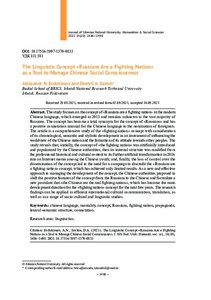The Linguistic Concept «Russians Are a Fighting Nation» as a Tool to Manage Chinese Social Consciousness
Скачать файл:
URI (для ссылок/цитирований):
https://elib.sfu-kras.ru/handle/2311/144698Автор:
Evdokimov, Aleksandr N.
Savkin, Dmitrii A.
Евдокимов, А. Н.
Савкин, Д. А.
Дата:
2021-10Журнал:
Журнал Сибирского федерального университета. Гуманитарные науки. Journal of Siberian Federal University. Humanities & Social Sciences; 2021 14 (10)Аннотация:
The study focuses on the concept of «Russians are a fighting nation» in the modern Chinese language, which emerged in 2013 and remains unknown to the vast majority of Russians. The concept has become a total synonym for the concept of «Russians» and has a positive connotation unusual for the Chinese language in the nomination of foreigners. The article is a comprehensive study of the «fighting nation» concept with consideration of its chronological, semantic and stylistic development as an instrument of influencing the worldview of the Chinese nation and the formation of its attitude towards other peoples. The study reveals that, initially, the concept of «the fighting nation» was artificially introduced and popularized by the Chinese authorities; then its internal structure was modified from the professional historical and cultural content to its further artificial transformation in 2016 into an Internet meme among the Chinese youth; and, finally, the loss of control over the dissemination of the concept led to the need for a campaign to discredit the «Russians are a fighting nation» concept, which has achieved only limited results. As a new and effective approach to managing the development of the concept, the Chinese authorities proposed to shift the positive features of the concept from the Russians to the Chinese and formulate a new postulate that «the Chinese are the real fighting nation», which has become the main development direction for the «fighting nation» concept for the next few years. The research findings can be applied in efficient international cultural communication, translation, as well as in a range of socio-cultural and linguistic studies В статье исследуется внезапно возникшее в китайском языке в начале
XXI века и получившее широчайшее распространение в китайской языковой картине
мира на всех языковых и социальных уровнях (за исключением официальной
дипломатической риторики) устойчивое выражение «боевая нация» (кит. 战斗民族,
zhàndòu mínzú), используемое исключительно для номинации жителей Российской
Федерации и ставшее общепринятым синонимом к понятию «русские».
На основе изучения китайских и российских источников авторами исследуется
диахроническое и синхроническое лексико-семантическое
значение концепта
«боевая нация», его коннотативные изменения, вызванные воздействием
целого ряда внешних факторов: пропагандистская деятельность, форсирование
и дискредитация концепта и т. д.; подробно анализируется структура концепта
«боевая нация», с выделением центральных и периферийных компонентов;
рассматриваются особенности функционирования концепта в среде современной
китайской молодежи

